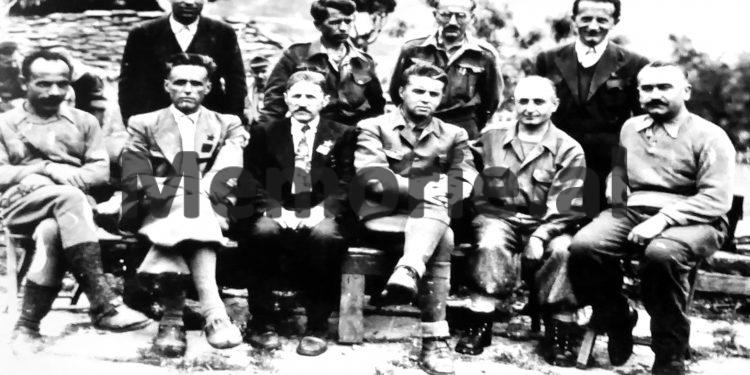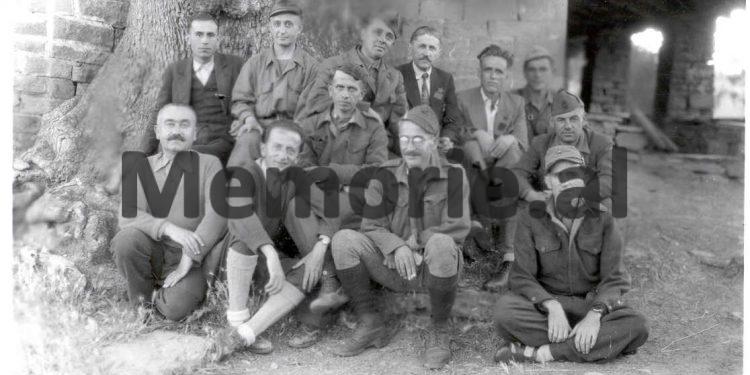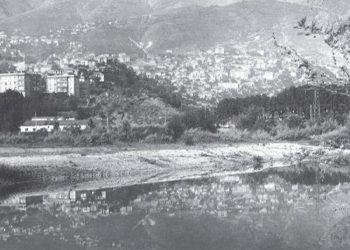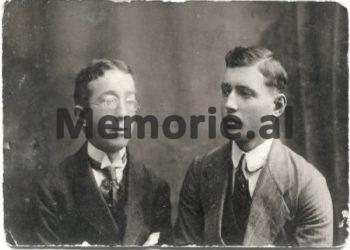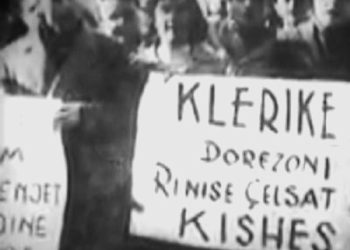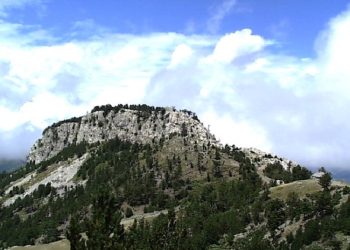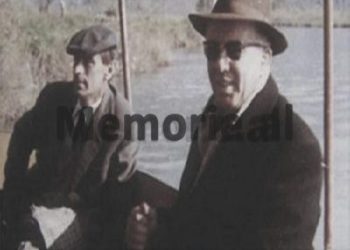Dashnor Kaloçi
Memorie.al/ publishes the rare testimonies of Mrs. Flora Sata Dishnica, former secretary of Enver Hoxha at the General Staff of the National Liberation Army, during the war, who passed away a few weeks ago, at the age of 96, who together with her husband, Dr. Ymer Dishnica and their children, suffered in exile until the beginning of the ’90s, after being beaten by Enver Hoxha, in the beginning of the’ 50s, as “enemies of the people”! Rare testimonies of Mrs. Dishnica, otherwise known as Gjystina Sata, regarding the intrigues, machinations and behind the scenes of Enver Hoxha, in the physical elimination of his closest friends and collaborators, such as Mustafa Gjinishi, for whom he (Enver) had charged Liri Gega, while she was in the district of Dibra with the First Assault Division, which she commanded, her husband, Major General, Dali Ndreu, who were also shot by Enver in 1956, also to cover the tracks of his crimes during the War period!
“Together with Teodor Heba, we were working with the secret figure in our room in Helmas, where the General Staff was located. We worked with three secret figures, which were: one for Miladin, one for Enver and the other open to all. Only Theodore and I knew these figures, which, according to the orders given to us by the persons to whom they were addressed, we either deciphered them ourselves or gave them to them. The telegram that came to Gjinish was very secret and was addressed to Enver by name. As soon as I got it, I took it to Enver and he said, ‘Decipher it yourself.’ The telegram read: ‘Everything ended successfully, according to your order. ‘Wait Phonogram ’. Theodore, who was a much closed man, told me to take it to Enver and I told him that I gave it to Enver, but he told me: ‘Decipher it you’. I, as a great curious I was, could not wait to see the next day that whatever that soundtrack had. That day came the long telegram with a simple figure for our office, where among other things it was said: ‘Passing on a mountain pass (I do not remember the name but it was somewhere in the area of Dibra), we encountered an ambush where it was positioned the treacherous hand of the enemy, who shot our dear friend Mustafa Gjinishi in the back. A great loss for us and for the War. We give you this news with great sadness’. After reading the phonogram, I said to Theodore: ‘This thing was successful’?! This is how the former secretary of Enver Hoxha at the General Staff of the National Liberation Army, Flora Sata Dishnica, remembered, who passed away a few weeks ago at the age of 96 (on November 7, 2020), the intrigues and behind the scenes of her former chief, regarding the physical elimination of Mustafa Gjinish, one of the personalities of the Antifascist War in Albania.
Continues from the last number
Enver: Gender agent of the English
How did the events regarding the contradictions between Enver and Gjinish unfold? In this regard, among other things, Enver recalled: “On the eve of the Youth Congress in Helma, I met with English Lieutenant Colonel Lick. From what he could smell, he knew we were going to have a convention. “Here is another sign”, I thought that the English should have an informant in our ranks, and this informant was Mustafa Gjinishi. This had long since become more than clear to me. As we were leaving Helmësi towards Staravecka, Gjinishi stood last and after remembering that there was no one back, he ran in a turn and met an English soldier, who gave him a letter. Mustafa turned his head and after seeing that we spotted him, put the letter in his pocket and continued on his way. When we asked him to deliver the letter to us, he told us: ‘I do not deliver the letter alive’ and that he delivered it because he delivered it! We cursed him and did not leave him without saying anything, and he only said: “Do what you want, I am like that and I will remain like that”.
Enver then states that he informed all his friends about that and threatened Gjinish again, that if he continued that way, he would order his arrest, while Myslym Peza had asked him to become the President of the Court for the conviction of his! At the end of the long notes about his relations with Gjinish, Enver testifies: “After the Congress of Përmet, we sent Gjinish to the North, near the partisan units. Again we treated that man with indulgence, but ‘the wolf changes his hair, but he usually forgets’. Even there, despite the heavy punch he had eaten, he did not give up maneuvers and rants to hit the Party. The First Division informed me that Gjinishi had complained to Haxhi Seser, saying: “Me and Dr. Dishnica, after Mukje, the Party does not like us, they did not give me the responsibility that belongs to me, and Haxhi Lleshi was made Minister of Interior. The party is afraid that I have a lot of influence on the people, they are afraid of me, that I have sympathy for the English. “Recently I had a conversation with Enver Hoxha, with whom we had a big argument”. As for Gjinish’s murder, with which Enver closes his notes, he recalls: “In August 1944, an English officer sent me a message that had come from his General Quarter in Bari, Italy, saying: Hoxha. I regret to inform you that Mustafa Gjinishi was killed in front of the First Division. He and Smith had been put into the well by a German patrol. Smith sound. Big loss for the Allies’ cause. Finally, the officer himself added: ‘Gjinishi was a great friend of ours’. It was clear from this document what a loss it was for the English, the death of Gjinish. It is equally clear to us that he was and remained, until he died, next to the mystery Smith, the Englishman, their agent and servant “, Enver concludes his considerations for Gjinish!
Testimony of Enver Secretary
Enver’s testimonies regarding Gjinish’s murder are refuted by Flora Sata Dishnica (wife of Dr. Ymer Dishnica), who during 1943-44, served as his secretary with the secret figure in the General Staff. Regarding this event, Mrs. Dishnica recalls: “Together with Teodor Heba, we were working with the secret figure in our room in Helmas, where the General Staff was located. We worked with three secret figures, which were: one for Miladin, one for Enver and the other open to all. Only Theodore and I knew these figures, which, according to the orders given to us by the persons to whom they were addressed, we either deciphered them ourselves or gave them to them. The telegram that came to Gjinish was very secret and was addressed to Enver by name. As soon as I got it, I took it to Enver and he told me: ‘Decipher it yourself’. The telegram read: ‘Everything ended successfully, according to your order. Wait phonogramin’. Theodore, who was a much closed man, told me to take him to Enver. I told Theodore that I had given it to Enver and he said, ‘Decipher it.’ I, as a great curious I was, could not wait to see the next day that whatever that soundtrack had. That day came the long telegram with a simple figure for our office, where among other things it was said: ‘Passing on a mountain pass (I do not remember the name but it was somewhere in the area of Dibra), we encountered an ambush where it was positioned the treacherous hand of the enemy, who shot our dear friend Mustafa Gjinishi in the back. A great loss for us and for the War. We give you this news with great sadness’. After reading the phonogram, I said to Theodore: ‘This thing was successful’?! Theodore said to me, ‘Do not talk too much, because it has nothing to do with what you say,’ and motioned for me to shut up. While we were waiting for the news to be communicated to us, Enver and Miladin told us that the ceremony would be organized, and at the same time the news of Gjinish’s murder would be given. That evening, Teodori went to listen to the news on Radio Tirana (as he usually did) and when he came, he was very upset and said: “How much is Dr. Dishnica”?! Teodorin, Dr. Dishnica loved him very much, so he almost cried the next day when he contacted the Doctor. I did not understand where he was talking about and what had happened. I learned this the next day from Theodore himself. That night, when he went to listen to the news, Radio-Tirana gave a statement to Xhelal Staravecka, (our former friend of the Staff who had passed with the General Gendarmerie in Tirana), which said: ‘The Communist Party of Albania, killed behind his back Mustafa Gjinishin, and now the murder of Dr. is expected. Ymer Dishnica ‘. This news was very unmasking for the main comrades of the Staff and thwarted their plans for the murder of Dishnica. As I later learned, Dr. Dishnica was allegedly sent to attend Baba Tomorri’s party in Qafën e Kulmakut, and they would kill him there! That is why Enver and Miladin were not organizing the ceremony for the murder of Gjinish, because they were waiting for Dishnica to be killed, and to do a ceremony for both of them. The ceremony for Gjinish’s murder took place after three days, where we held a minute of mourning “, recalled Flora Sata Dishnica, former secretary of Enver Hoxha at the General Staff during the war, shedding light on the intrigues, machinations and behind the scenes of the former -his boss, regarding the physical elimination of his close associates, such as Mustafa Gjinishi.
Enver’s testimonies questionable!
All of Enver’s memories of Mustafa Gjinishi are very dubious and almost entirely unbelievable. This is due to the fact that Enver had published these memoirs only in his last book “The Anglo-American Danger” in 1982, when all the characters he mentions there, such as Peza, Moses, Pillar and others, had passed away. . This makes you doubt it, because although those memoirs speak of a distant time, that of the War, they were left by him, to be published last, when all the collaborators he mentions there had died, as it seems to him created his alibis. It is unbelievable that Myslym Peza told Enver that: ‘he wanted to become the President of the Court for the sentencing of Gjinish’, who had the son of his brother-in-law, Adem Gjinish, whom when he was killed, he had he (Myslymi) took revenge. Likewise, among other things, this thing (ie Enver’s statement that Myslym Peza asked him to become the president of the court for Gjinish’s conviction), does not stand, because in an archival document that was published after the ’90s, it is Gogo Nushi’s letter to Enver Hoxha, where, among other things, he writes: “Baba Myslymi cried when he learned of Gjinish’s murder and said that: he was killed by his comrades, that he was better than them”.
Even without the testimony of Enver’s former secretary, Flora Sata Dishnica, it is quite clear that; Enver Hoxha was the one who ordered Gjinish’s assassination, because, among other things, he suspected that Mustafai was the agent of the British, and that the British, in their efforts to establish an Albanian government in exile (as they had done with the Greeks and Yugoslavs), in Albania they would use Gjinish as their main “card”. It seems that Gjinish’s murder has bothered Enver a lot, as long as he stops so long in his memories and to remove the shadows of doubt from himself, so that he had no finger in that murder, as rarely ever, he mentions the officer’s report British Smith, who was shot by the Germans along with Gjinish. This report may be true, with the only difference, that German patrols were not shot at Gjinish and Smith, but the partisans commanded by Liri Gega, which is confirmed by the testimony of Enver’s former secretary, who has deciphering the telegram that Liri Gega sent to the General Staff, which said: “Everything ended successfully according to your order.” Ten years later, in 1956, perhaps to cover the traces of this crime, Enver Hoxha, ordered and the execution of Liri Gega (and her husband, Major General Dali Ndreu, former Commander of the First Division of the National Liberation Army), even though she was pregnant, which was protested at the time by Nikita Khrushchev./Memorie.al






